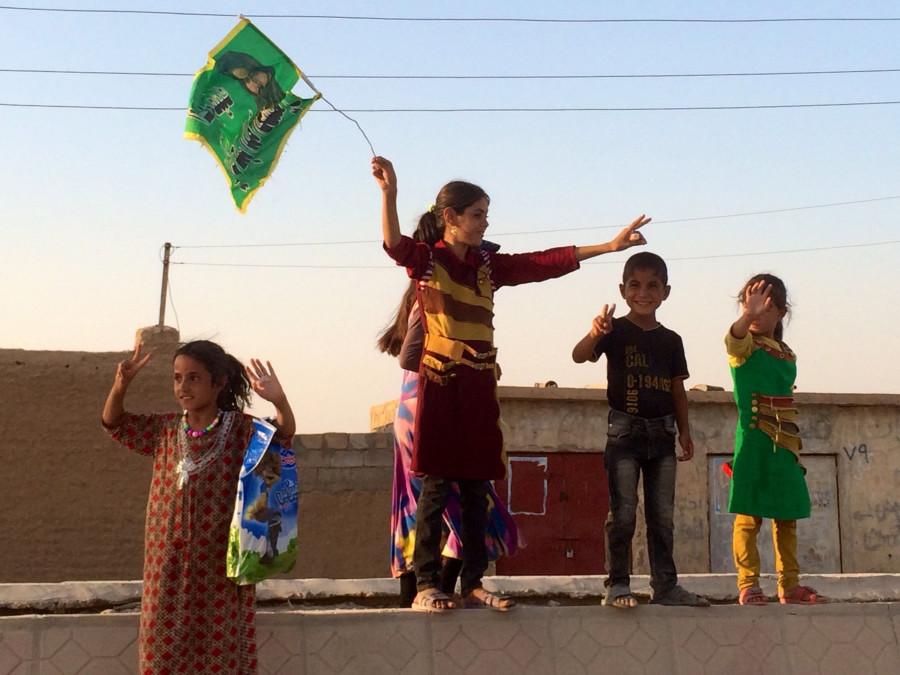ISIS is complicated…
Photo by Shashank Bengali from Los Angeles Times via Tribune Media Content used with permission
Children greet Shiite militiamen entering Amirli, Iraq, on Monday, Sept. 1, 2014, after Iraqi forces liberated the town from a nearly three-month siege by Islamic State militants.
September 4, 2014
It seems that no one can agree about an US response to ISIS. We can’t even agree about its name. Is it Islamic State of Iraq and Syria, or ISIL, the Islamic State of Iraq and the Levant?
Luckily, we can agree that ISIS is bad. It poses a threat to our country and our closest allies. So, something needs to be done. And this is when discussions go awry. What we don’t need are blanketed responses that unravel US foreign policy and further add to the number of people that hate us.
And this is where ISIS’s name comes in handy. The Islamic State of Iraq and Syria is a two pronged effort that elicits a two pronged response that deals with the two different situations in Syria and Iraq.
First things first, the whole reason that ISIS is such a threat to US security is because it is popular. Obviously not in the US, but in the very places it has taken over. The Islamic State is trying to establish a caliphate (aka entirely Muslim mini-nation) by utilizing fear, terror, and disapproval of the respective governments.
As a Sunni jihadist group, ISIS has been accepted in many parts of Iraq and Syria that are under harsh, repressive, and violent Shia control. Yet, the support is not on religious grounds, it is political. Iraq under Prime Minister Nouri al-Maliki was a mess and Syria under President Bashar al-Assad is hell.
So, while the violent radicalism of ISIS is unpopular (even to Al-Qaeda), its ability to provide basic human necessities like medicine and nourishment makes it powerful.
Another problem is ISIS’s popularity in the West. A poll in late August by ICM found that 16% of French citizens sympathize with ISIS. The ISIS member that brutally murdered American journalist James Foley was quite possibly from London. Worse yet, over 100 Americans have joined the ranks of ISIS.
Something needs to be done. Actually, somethings. Truth be told, arguing for a single action or plan against ISIS is being disrespectful to its terrifying power. While ISIS might not pose short-term danger to the US, it threatens the world’s very safety in the long run.
In Iraq, the presence of ISIS endangers our vested interests in the country. They have tried to exterminate the Yazidi people by trapping them on the Sinjar Mountains, causing a humanitarian crisis, and topple the Kurdish government in the northeast, causing backlash from the US by threatening the Kurdish self-government, something the US has fought for.
These actions elicited US aerial bombing raids and humanitarian drops, which was the right call from President Barack Obama. But the next step is to have the US lead the international community in fixing Iraq’s broken political system. The US must push new Iraqi Prime Minister Haider al-Abadi forward and not go back to the days of al-Maliki.
But in Syria, the US needs a completely different approach. If we try to decimate ISIS in Syria immediately, it will play straight into the hands of President Assad. Aligning ourselves with such a monster will make ending the brutal Syrian Civil War impossible.
So, the US needs to arm and advise the Free Syrian Army, the main secular, moderate rebel group in the Syrian Civil War, to finally end Assad’s evil reign before turning focus to stopping ISIS in Syria. But, we must make sure that the rebels do not take our weapons and defect to ISIS like they have in the past.
Finally, the US should confront Saudi Arabia, Qatar, and Kuwait (aka our allies) about their funding of ISIS and causing factions in the Syrian rebel groups. We must use our influence to slow down, if not completely stop, these Gulf States from funding any militias.
There is no one simple plan of action the US can use against ISIS. The reason we like plans that are multifaceted, multilateral, and multi-pronged are not because big words sound smart or we like the prefix multi-, it is because they work.








